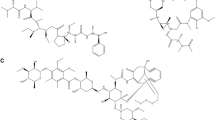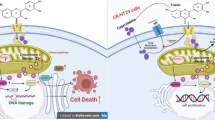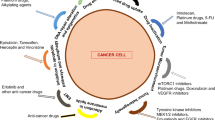Abstract
Resistance to anticancer drugs is a major problem in oncology, which causes the failure of antitumor treatment. A variety of factors contribute to drug resistance, including drug efflux and metabolism, tumor cell heterogeneity, tumor microenvironment stress-induced genetic or epigenetic alterations in the cancer cells and so on. However, how to circumvent this resistance to improve anticancer efficacy remains to be determined. To circumvent chemotherapeutic resistance, many reversal agents have been developed, but most of them fail in clinical trials due to severe adverse effects. Recently, several natural products have been reported to augment sensitivity or overcome resistance of anticancer chemotherapeutic drugs, including elemene, curcumin, Shenqi Fuzheng Injection (参芪扶正注射液), PHY906, etc. Thus, understanding the novel function of Chinese medicine may allow us to develop a promising therapeutic approach to enhance the effects of anticancer strategies and prevent or overcome their resistance in the treatment of cancer patients.
Similar content being viewed by others
References
Parikh AR, Leshchiner I, Elagina L, Goyal L, Levovitz C, Siravegna G, et al. Liquid versus tissue biopsy for detecting acquired resistance and tumor heterogeneity in gastrointestinal cancers. Nat Med 2019;25:1415–1421.
Off-target alterations drive resistance to TRK inhibitors in some cancers. Cancer Discov 2019;9:OF7.
Kim SG, Becattini S, Moody TU, Shliaha PV, Littmann ER, Seok R, et al. Microbiota-derived lantibiotic restores resistance against vancomycin-resistant Enterococcus. Nature 2019;572:665–669.
The Lancet O. Rethinking traditional Chinese medicines for cancer. Lancet Oncol 2015;16:1439.
Efferth T, Li PC, Konkimalla VS, Kaina B. From traditional Chinese medicine to rational cancer therapy. Trends Mol Med 2007;13:353–361.
Luo C, Xu X, Wei X, Feng W, Huang H, Liu H, et al. Natural medicines for the treatment of fatigue: bioactive components, pharmacology, and mechanisms. Pharmacol Res 2019;148:104409.
Liu YX, Bai JX, Li T, Fu XQ, Guo H, Zhu PL, et al. A TCM formula comprising Sophorae Flos and Lonicerae Japonicae Flos alters compositions of immune cells and molecules of the STAT3 pathway in melanoma microenvironment. Pharmacol Res 2019;142:115–126.
Jiao L, Xu J, Sun J, Chen Z, Gong Y, Bi L, et al. Chinese herbal medicine combined with EGFR-TKI in EGFR mutation-positive advanced pulmonary adenocarcinoma (CATLA): a multicenter, randomized, double-blind, placebocontrolled trial. Front Pharmacol 2019;10:732.
Wei C, Yao X, Jiang Z, Wang Y, Zhang D, Chen X, et al. Cordycepin inhibits drug-resistance non-small cell lung cancer progression by activating AMPK signaling pathway. Pharmacol Res 2019;144:79–89.
Lu JJ, Dang YY, Huang M, Xu WS, Chen XP, Wang YT. Anti-cancer properties of terpenoids isolated from Rhizoma curcumae—a review. J Ethnopharmacol 2012;143:406–411.
Aggarwal BB, Yuan W, Li S, Gupta SC. Curcumin-free turmeric exhibits anti-inflammatory and anticancer activities: identification of novel components of turmeric. Mol Nutr Food Res 2013;57:1529–1542.
An YW, Hu G, Yin GP, Zhu JJ, Zhang QW, Wang ZM, et al. Quantitative analysis and discrimination of steamed and non-steamed rhizomes of Curcuma wenyujin by GC-MS and HPLC. J Chromatogr Sci 2014;52:961–970.
Zhai B, Zeng Y, Zeng Z, Zhang N, Li C, Zeng Y, et al. Drug delivery systems for elemene, its main active ingredient beta-elemene, and its derivatives in cancer therapy. Int J Nanomedicine 2018;13:6279–6296.
Zhai B, Zhang N, Han X, Li Q, Zhang M, Chen X, et al. Molecular targets of beta-elemene, a herbal extract used in traditional Chinese medicine, and its potential role in cancer therapy: a review. Biomed Pharmacother 2019;114:108812.
Wang X, Liu Z, Sui X, Wu Q, Wang J, Xu C. Elemene Injection as adjunctive treatment to platinum-based chemotherapy in patients with stage III/IV non-small cell lung cancer: a meta-analysis following the PRISMA guidelines. Phytomedicine 2019;59:152787.
Xu XW, Yuan ZZ, Hu WH, Wang XK. Meta-analysis on Elemene Injection combined with cisplatin chemotherapeutics in treatment of non-small cell lung cancer. Chin J Chin Mater Med (Chin) 2013;38:1430–1437.
Cheng H, Ge X, Zhuo S, Gao Y, Zhu B, Zhang J, et al. Beta-elemene synergizes with gefitinib to inhibit stemlike phenotypes and progression of lung cancer via downregulating EZH2. Front Pharmacol 2018;9:1413.
Zhou K, Wang L, Cheng R, Liu X, Mao S, Yan Y. Elemene increases autophagic apoptosis and drug sensitivity in human cisplatin (DDP)-resistant lung cancer cell line SPC-A-1/DDP by inducing beclin-1 expression. Oncol Res 2017; May 23 [Epub ahead of print].
Lin L, Li L, Chen X, Zeng B, Lin T. Preliminary evaluation of the potential role of beta-elemene in reversing erlotinibresistant human NSCLC A549/ER cells. Oncol Lett 2018;16:3380–3388.
Guo Z, Liu Z, Yue H, Wang J. Beta-elemene increases chemosensitivity to 5-fluorouracil through down-regulating microRNA-191 expression in colorectal carcinoma cells. J Cell Biochem 2018;119:7032–7039.
Huang C, Yu Y. Synergistic cytotoxicity of beta-elemene and cisplatin in gingival squamous cell carcinoma by inhibition of STAT3 signaling pathway. Med Sci Monit 2017;23:1507–1513.
Mu L, Wang T, Chen Y, Tang X, Yuan Y, Zhao Y. Betaelemene enhances the efficacy of gefitinib on glioblastoma multiforme cells through the inhibition of the EGFR signaling pathway. Int J Oncol 2016;49:1427–1436.
Zhang J, Zhang HD, Yao YF, Zhong SL, Zhao JH, Tang JH. Beta-elemene reverses chemoresistance of breast cancer cells by reducing resistance transmission via exosomes. Cell Physiol Biochem 2015;36:2274–2286.
Zhang J, Zhang H, Chen L, Sun DW, Mao CF, Chen W, et al. Beta-elemene reverses chemoresistance of breast cancer via regulating MDR-related microRNA expression. Cell Physiol Biochem 2014;34:2027–2037.
Aggarwal BB, Sundaram C, Malani N, Ichikawa H. Curcumin: the Indian solid gold. Adv Exp Med Biol 2007;595:1–75.
Landis-Piwowar KR, Milacic V, Chen D, Yang H, Zhao Y, Chan TH, et al. The proteasome as a potential target for novel anticancer drugs and chemosensitizers. Drug Resist Updat 2006;9:263–273.
Chen P, Huang HP, Wang Y, Jin J, long WG, Chen K, et al. Curcumin overcome primary gefitinib resistance in nonsmall-cell lung cancer cells through inducing autophagyrelated cell death. J Exp Clin Cancer Res 2019;38:254.
Zhang P, Lai ZL, Chen HF, Zhang M, Wang A, Jia T, et al. Curcumin synergizes with 5-fluorouracil by impairing AMPK/ULK1-dependent autophagy, AKT activity and enhancing apoptosis in colon cancer cells with tumor growth inhibition in xenograft mice. J Exp Clin Cancer Res 2017;36:190.
Roy M, Mukherjee S. Reversal of resistance towards cisplatin by curcumin in cervical cancer cells. Asian Pac J Cancer Prev 2014;15:1403–1410.
Sandur SK, Deorukhkar A, Pandey MK, Pabón AM, Shentu S, Guha S, et al. Curcumin modulates the radiosensitivity of colorectal cancer cells by suppressing constitutive and inducible NF-kappaB activity. Int J Radiat Oncol Biol Phys 2009;75:534–542.
Kunnumakkara AB, Guha S, Krishnan S, Diagaradjane P, Gelovani J, Aggarwal BB. Curcumin potentiates antitumor activity of gemcitabine in an orthotopic model of pancreatic cancer through suppression of proliferation, angiogenesis, and inhibition of nuclear factor-kappaB-regulated gene products. Cancer Res 2007;67:3853–3861.
Hu Y, Lu W, Chen G, Zhang H, Jia Y, Wei Y, et al. Overcoming resistance to histone deacetylase inhibitors in human leukemia with the redox modulating compound betaphenylethyl isothiocyanate. Blood 2010;116:2732–2741.
Hasegawa H, Yamada Y, Komiyama K, Hayashi M, Ishibashi M, Sunazuka T, et al. A novel natural compound, a cycloanthranilylproline derivative (Fuligocandin B), sensitizes leukemia cells to apoptosis induced by tumor necrosis factor related apoptosis-inducing ligand (TRAIL) through 15-deoxy-delta 12, 14 prostaglandin J2 production. Blood 2007;110:1664–1674.
Dong J, Su SY, Wang MY, Zhan Z. Shenqi Fuzheng, an injection concocted from Chinese medicinal herbs, combined with platinum-based chemotherapy for advanced non-small cell lung cancer: a systematic review. J Exp Clin Cancer Res 2010;29:137.
Li S, Xu J, Yao Z, Hu L, Qin Z, Gao H, et al. The roles of breast cancer resistance protein (BCRP/ABCG2) and multidrug resistance-associated proteins (MRPs/ABCCs) in the excretion of cycloicaritin-3-O-glucoronide in UGT1A1-overexpressing HeLa cells. Chem Biol Interact 2018;296:45–56.
Wu L, Cao KX, Ni ZH, Li WD, Chen ZP, Chang HB, et al. Effects of Dahuang Zhechong Pill on doxorubicin-resistant SMMC-7721 xenografts in mice. J Ethnopharmacol 2018;222:71–78.
Lam W, Jiang Z, Guan F, Huang X, Hu R, Wang J, et al. PHY906(KD018), an adjuvant based on a 1800-year-old Chinese medicine, enhanced the anti-tumor activity of Sorafenib by changing the tumor microenvironment. Sci Rep 2015;5:9384.
Pan B, Cheng T, Nan KJ, Qiu GQ, Sun XC. Effect of Fuzheng Yiliu Decoction combined with chemotherapy on patients with intermediate and late stage gastrointestinal cancer. World J Gastroenterol 2005;11:439–442.
Author information
Authors and Affiliations
Corresponding author
Ethics declarations
The authors declare no conflict of interest. None of the contents of this manuscript has been previously published or is under consideration elsewhere. All the authors read and approved the final version of the manuscript prior to submission.
Additional information
Supported by the National Natural Science Foundation of China (No. 81672932, 81730108, 81874380 and 81973635), Zhejiang Provincial Natural Science Foundation of China for Distinguished Young Scholars (No. LR18H160001), Zhejiang Province Science and Technology Project of TCM (No. 2019ZZ016), Zhejiang Province Medical Science and Technology Project (No. 2017RC007), Talent Project of Zhejiang Association for Science and Technology (No. 2017YCGC002), Key Project of Hangzhou Ministry of Science and Technology (No. 20162013A07)
Rights and permissions
About this article
Cite this article
Sui, Xb., Xie, T. Combination of Chinese and Western Medicine to Prevent and Reverse Resistance of Cancer Cells to Anticancer Drugs. Chin. J. Integr. Med. 26, 251–255 (2020). https://doi.org/10.1007/s11655-019-3180-x
Accepted:
Published:
Issue Date:
DOI: https://doi.org/10.1007/s11655-019-3180-x




